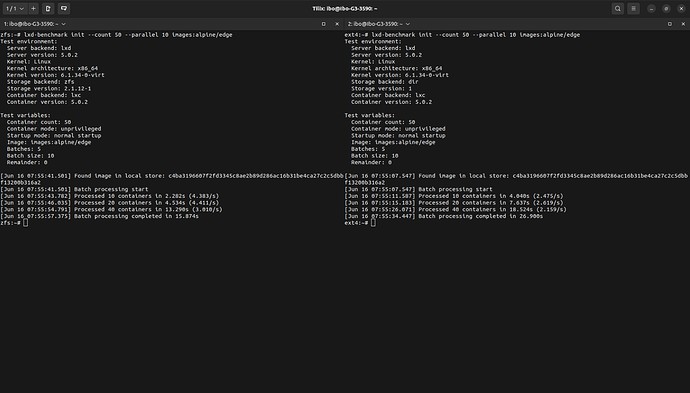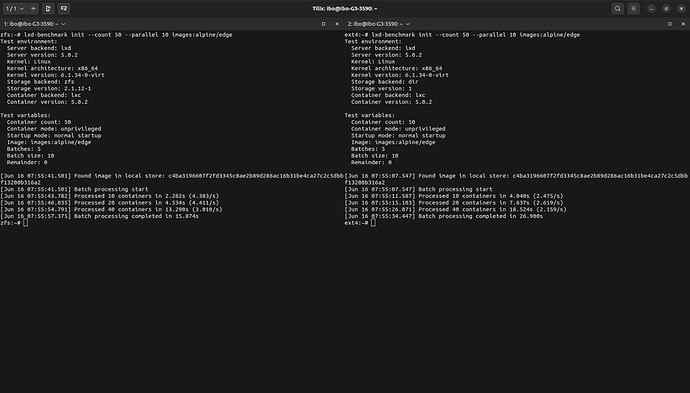## Performing a Random Write Test on LXD with ZFS
fiozfs:~# sudo fio --name=randwrite --ioengine=libaio --iodepth=1 --rw=randwrite
–bs=4k --direct=0 --size=512M --numjobs=2 --runtime=240 --group_reporting
randwrite: (g=0): rw=randwrite, bs=(R) 4096B-4096B, (W) 4096B-4096B, (T) 4096B-4096B, ioengine=libaio, iodepth=1
…
fio-3.35
Starting 2 processes
randwrite: Laying out IO file (1 file / 512MiB)
randwrite: Laying out IO file (1 file / 512MiB)
Jobs: 2 (f=2): [w(2)][83.3%][w=180MiB/s][w=46.0k IOPS][eta 00m:01s]
randwrite: (groupid=0, jobs=2): err= 0: pid=482: Mon Jun 12 16:15:10 2023
write: IOPS=46.5k, BW=181MiB/s (190MB/s)(1024MiB/5642msec); 0 zone resets
slat (usec): min=5, max=192287, avg=40.12, stdev=933.48
clat (nsec): min=977, max=454355, avg=1494.36, stdev=1498.11
lat (usec): min=6, max=192292, avg=41.62, stdev=933.57
clat percentiles (nsec):
| 1.00th=[ 1020], 5.00th=[ 1032], 10.00th=[ 1048], 20.00th=[ 1064],
| 30.00th=[ 1080], 40.00th=[ 1096], 50.00th=[ 1128], 60.00th=[ 1368],
| 70.00th=[ 1672], 80.00th=[ 1752], 90.00th=[ 2224], 95.00th=[ 2928],
| 99.00th=[ 3728], 99.50th=[ 4256], 99.90th=[ 8096], 99.95th=[10688],
| 99.99th=[35584]
bw ( KiB/s): min=71152, max=317600, per=96.46%, avg=179280.73, stdev=37064.61, samples=22
iops : min=17788, max=79400, avg=44820.18, stdev=9266.15, samples=22
lat (nsec) : 1000=0.01%
lat (usec) : 2=87.57%, 4=11.87%, 10=0.49%, 20=0.05%, 50=0.01%
lat (usec) : 100=0.01%, 250=0.01%, 500=0.01%
cpu : usr=7.32%, sys=60.55%, ctx=13047, majf=0, minf=21
IO depths : 1=100.0%, 2=0.0%, 4=0.0%, 8=0.0%, 16=0.0%, 32=0.0%, >=64=0.0%
submit : 0=0.0%, 4=100.0%, 8=0.0%, 16=0.0%, 32=0.0%, 64=0.0%, >=64=0.0%
complete : 0=0.0%, 4=100.0%, 8=0.0%, 16=0.0%, 32=0.0%, 64=0.0%, >=64=0.0%
issued rwts: total=0,262144,0,0 short=0,0,0,0 dropped=0,0,0,0
latency : target=0, window=0, percentile=100.00%, depth=1
Run status group 0 (all jobs):
WRITE: bw=181MiB/s (190MB/s), 181MiB/s-181MiB/s (190MB/s-190MB/s), io=1024MiB (1074MB), run=5642-5642msec
fiozfs:~#
## Performing a Random Read Test on LXD with ZFS
fiozfs:~# sudo fio --name=randread --ioengine=libaio --iodepth=16 --rw=randread
–bs=4k --direct=0 --size=512M --numjobs=4 --runtime=240 --group_reporting
randread: (g=0): rw=randread, bs=(R) 4096B-4096B, (W) 4096B-4096B, (T) 4096B-4096B, ioengine=libaio, iodepth=16
…
fio-3.35
Starting 4 processes
randread: Laying out IO file (1 file / 512MiB)
randread: Laying out IO file (1 file / 512MiB)
randread: Laying out IO file (1 file / 512MiB)
randread: Laying out IO file (1 file / 512MiB)
Jobs: 3 (f=2): [r(2),f(1),_(1)][100.0%][r=306MiB/s][r=78.4k IOPS][eta 00m:00s]
randread: (groupid=0, jobs=4): err= 0: pid=518: Mon Jun 12 16:16:37 2023
read: IOPS=97.5k, BW=381MiB/s (400MB/s)(2048MiB/5375msec)
slat (usec): min=3, max=6845, avg=29.11, stdev=26.34
clat (usec): min=2, max=7732, avg=471.67, stdev=256.58
lat (usec): min=5, max=7817, avg=500.78, stdev=272.38
clat percentiles (usec):
| 1.00th=[ 83], 5.00th=[ 86], 10.00th=[ 87], 20.00th=[ 89],
| 30.00th=[ 363], 40.00th=[ 529], 50.00th=[ 578], 60.00th=[ 611],
| 70.00th=[ 644], 80.00th=[ 676], 90.00th=[ 717], 95.00th=[ 750],
| 99.00th=[ 840], 99.50th=[ 963], 99.90th=[ 1270], 99.95th=[ 1516],
| 99.99th=[ 2245]
bw ( KiB/s): min=930737, max=970672, per=100.00%, avg=948946.16, stdev=3650.52, samples=30
iops : min=232684, max=242668, avg=237236.28, stdev=912.61, samples=30
lat (usec) : 4=0.01%, 10=0.01%, 20=0.01%, 50=0.01%, 100=23.14%
lat (usec) : 250=4.59%, 500=9.19%, 750=58.18%, 1000=4.52%
lat (msec) : 2=0.35%, 4=0.01%, 10=0.01%
cpu : usr=8.39%, sys=90.87%, ctx=795, majf=0, minf=98
IO depths : 1=0.1%, 2=0.1%, 4=0.1%, 8=0.1%, 16=100.0%, 32=0.0%, >=64=0.0%
submit : 0=0.0%, 4=100.0%, 8=0.0%, 16=0.0%, 32=0.0%, 64=0.0%, >=64=0.0%
complete : 0=0.0%, 4=100.0%, 8=0.0%, 16=0.1%, 32=0.0%, 64=0.0%, >=64=0.0%
issued rwts: total=524288,0,0,0 short=0,0,0,0 dropped=0,0,0,0
latency : target=0, window=0, percentile=100.00%, depth=16
Run status group 0 (all jobs):
READ: bw=381MiB/s (400MB/s), 381MiB/s-381MiB/s (400MB/s-400MB/s), io=2048MiB (2147MB), run=5375-5375msec
## Performing a Random Write Test on LXD with EXT4
fioext4:~# sudo fio --name=randwrite --ioengine=libaio --iodepth=1 --rw=randwrit
e --bs=4k --direct=0 --size=512M --numjobs=2 --runtime=240 --group_reporting
randwrite: (g=0): rw=randwrite, bs=(R) 4096B-4096B, (W) 4096B-4096B, (T) 4096B-4096B, ioengine=libaio, iodepth=1
…
fio-3.35
Starting 2 processes
randwrite: Laying out IO file (1 file / 512MiB)
randwrite: Laying out IO file (1 file / 512MiB)
randwrite: (groupid=0, jobs=2): err= 0: pid=490: Mon Jun 12 16:18:53 2023
write: IOPS=523k, BW=2044MiB/s (2143MB/s)(1024MiB/501msec); 0 zone resets
slat (usec): min=2, max=318, avg= 2.41, stdev= 1.41
clat (nsec): min=745, max=317643, avg=834.70, stdev=1069.89
lat (usec): min=2, max=320, avg= 3.24, stdev= 1.79
clat percentiles (nsec):
| 1.00th=[ 772], 5.00th=[ 780], 10.00th=[ 788], 20.00th=[ 796],
| 30.00th=[ 796], 40.00th=[ 804], 50.00th=[ 804], 60.00th=[ 812],
| 70.00th=[ 812], 80.00th=[ 820], 90.00th=[ 852], 95.00th=[ 1112],
| 99.00th=[ 1192], 99.50th=[ 1208], 99.90th=[ 1224], 99.95th=[ 1416],
| 99.99th=[ 6688]
bw ( KiB/s): min=1047144, max=1047144, per=50.03%, avg=1047144.00, stdev= 0.00, samples=1
iops : min=261788, max=261788, avg=261788.00, stdev= 0.00, samples=1
lat (nsec) : 750=0.01%, 1000=93.45%
lat (usec) : 2=6.51%, 4=0.01%, 10=0.02%, 20=0.01%, 50=0.01%
lat (usec) : 500=0.01%
cpu : usr=42.56%, sys=57.24%, ctx=7, majf=0, minf=19
IO depths : 1=100.0%, 2=0.0%, 4=0.0%, 8=0.0%, 16=0.0%, 32=0.0%, >=64=0.0%
submit : 0=0.0%, 4=100.0%, 8=0.0%, 16=0.0%, 32=0.0%, 64=0.0%, >=64=0.0%
complete : 0=0.0%, 4=100.0%, 8=0.0%, 16=0.0%, 32=0.0%, 64=0.0%, >=64=0.0%
issued rwts: total=0,262144,0,0 short=0,0,0,0 dropped=0,0,0,0
latency : target=0, window=0, percentile=100.00%, depth=1
Run status group 0 (all jobs):
WRITE: bw=2044MiB/s (2143MB/s), 2044MiB/s-2044MiB/s (2143MB/s-2143MB/s), io=1024MiB (1074MB), run=501-501msec
## Performing a Random Read Test on LXD with EXT4
fioext4:~# sudo fio --name=randread --ioengine=libaio --iodepth=16 --rw=randread
–bs=4k --direct=0 --size=512M --numjobs=4 --runtime=240 --group_reporting
randread: (g=0): rw=randread, bs=(R) 4096B-4096B, (W) 4096B-4096B, (T) 4096B-4096B, ioengine=libaio, iodepth=16
…
fio-3.35
Starting 4 processes
randread: Laying out IO file (1 file / 512MiB)
randread: Laying out IO file (1 file / 512MiB)
randread: Laying out IO file (1 file / 512MiB)
randread: Laying out IO file (1 file / 512MiB)
randread: (groupid=0, jobs=4): err= 0: pid=526: Mon Jun 12 16:20:07 2023
read: IOPS=1150k, BW=4491MiB/s (4709MB/s)(2048MiB/456msec)
slat (nsec): min=1534, max=334129, avg=2128.92, stdev=1599.05
clat (nsec): min=1831, max=389773, avg=52773.81, stdev=8694.08
lat (usec): min=3, max=393, avg=54.90, stdev= 9.00
clat percentiles (usec):
| 1.00th=[ 48], 5.00th=[ 49], 10.00th=[ 50], 20.00th=[ 50],
| 30.00th=[ 50], 40.00th=[ 51], 50.00th=[ 51], 60.00th=[ 51],
| 70.00th=[ 52], 80.00th=[ 52], 90.00th=[ 60], 95.00th=[ 72],
| 99.00th=[ 74], 99.50th=[ 75], 99.90th=[ 86], 99.95th=[ 96],
| 99.99th=[ 388]
lat (usec) : 2=0.01%, 4=0.01%, 10=0.01%, 20=0.01%, 50=24.65%
lat (usec) : 100=75.30%, 250=0.01%, 500=0.03%
cpu : usr=42.53%, sys=56.86%, ctx=10, majf=0, minf=100
IO depths : 1=0.1%, 2=0.1%, 4=0.1%, 8=0.1%, 16=100.0%, 32=0.0%, >=64=0.0%
submit : 0=0.0%, 4=100.0%, 8=0.0%, 16=0.0%, 32=0.0%, 64=0.0%, >=64=0.0%
complete : 0=0.0%, 4=100.0%, 8=0.0%, 16=0.1%, 32=0.0%, 64=0.0%, >=64=0.0%
issued rwts: total=524288,0,0,0 short=0,0,0,0 dropped=0,0,0,0
latency : target=0, window=0, percentile=100.00%, depth=16
Run status group 0 (all jobs):
READ: bw=4491MiB/s (4709MB/s), 4491MiB/s-4491MiB/s (4709MB/s-4709MB/s), io=2048MiB (2147MB), run=456-456msec


